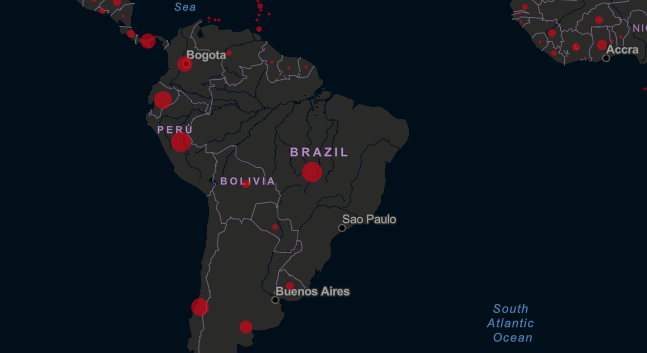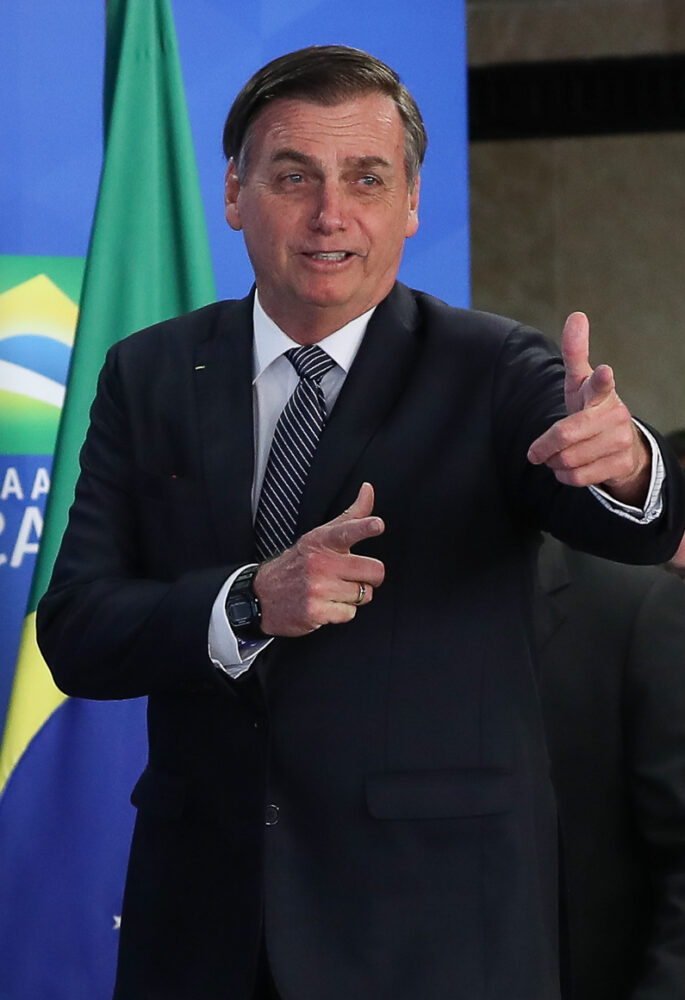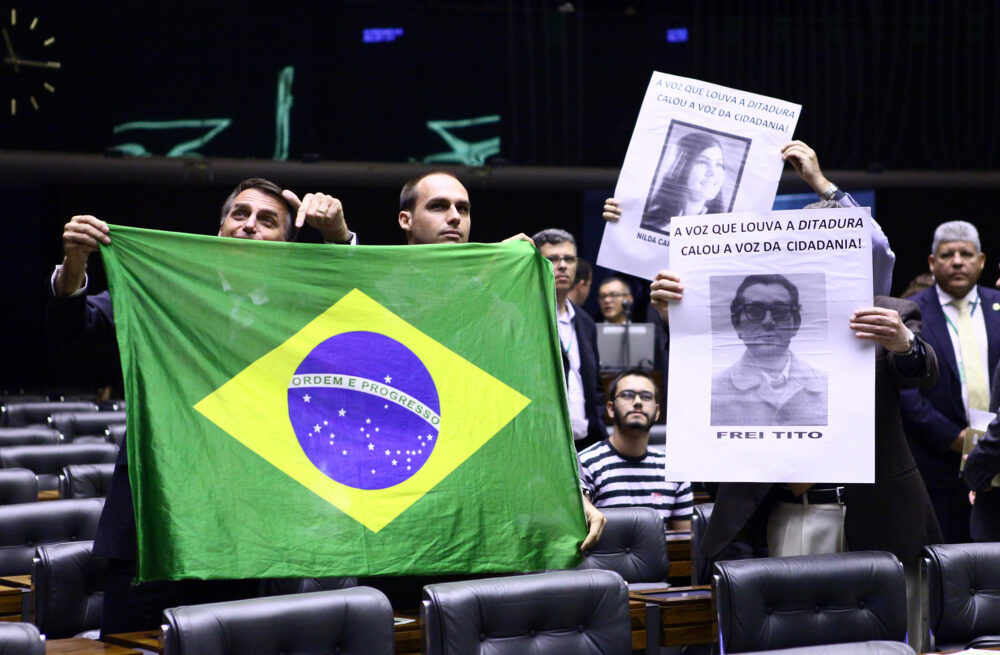The main objective of the Brazilian president’s expanded authority is expected to be the prevention and possible repressions of a social explosion, write Anis Chowdhury and Jomo Kwame Sundaram.

Portion of Johns Hopkins Covid-19 global map tracker, April 22, 2020. (Screenshot)
By Jomo Kwame Sundaram in Kuala Lumpur
and Anis Chowdhury in Sydney
Inter Press Service

 Brazil’s President Jair Bolsonaro appointed medical entrepreneur Nelson Teich his new health minister on 17 April. The businessman quickly echoed his boss’s desire to resume business as usual regardless of its potentially lethal consequences.
Brazil’s President Jair Bolsonaro appointed medical entrepreneur Nelson Teich his new health minister on 17 April. The businessman quickly echoed his boss’s desire to resume business as usual regardless of its potentially lethal consequences.
Bolsonaro had fired his previous health minister, displeased by Luiz Henrique Mandetta’s public remarks on the need for lockdowns and physical distancing. Mandetta’s firing was met with outrage across Brazil. Locked-down citizens banged pots and pans, shouting “Bolsonaro Murderer.”
In his final briefing as minister, Mandetta urged staff to challenge “denialism” and mount an “unyielding defence of life and science.” “Don’t be afraid,” he said, “Science is light … and it is through science that we will find a way out of this.”
Meanwhile, Brazil has begun digging large graveyards ahead of an anticipated peak of the national Covid-19 epidemic. In Sao Paulo’s Vila Formosa cemetery, the largest in Latin America, about 20 excavators are digging around the clock.
In an impassioned interview, popular former President Lula da Silva accused Bolsonaro of leading Brazilians “to the slaughterhouse” with his irresponsible handling of the crisis. Officially confirmed cases have soared to over 38,000, with close to 2,500 deaths as of April 19.
But these figures likely understate the gravity of the situation as Brazil’s states have no standardized testing method, and mainly test those hospitalized. A Brazilian research group estimates actual infections at 15 times the official number. Lula’s successor, Dilma Rousseff has asked: “Why is there no testing? What are they trying to conceal?”
Another study projects that without any action to stem the pandemic, Brazil could face more than 1.15 million deaths with only “enhanced social distancing” for the elderly over 70. Even with extreme lockdown measures and widespread testing, the death toll would still be 44,200 due to late action.
Bolsonaro vs State Governors
Despite the life-threatening risks, Bolsonaro has compared the Covid-19 threat to a “little flu” or “cold,” dismissing it as a media-hyped “fantasy.” He has dismissed preventive measures as “hysterical” and has repeatedly demanded that state governors withdraw their social distancing orders.

Brazilian President Jair Bolsonaro is known for his finger-gun gesture, which he used during the presidential campaign. (Marcos Corrêa, Wikimedia Commons)
On March 24, Bolsonaro emulated U.S. President Donald Trump, claiming “those under 40 rarely die of coronavirus and that even he, at 65, shouldn’t be worried because he was ‘an athlete’ in the past.” On April 8, Bolsonaro passed the buck, “Each family has to protect its elderly people, not to throw that responsibility to the state.”
Bolsonaro has disregarded social distancing recommendations, urging others to also defy them. At a pro-government rally he called on March 15, he shook hands with the crowd while supposed to be in quarantine after 24 people who had travelled with him to the United States had tested positive for the virus!
The Brazilian president has also lashed out at Brazil’s state governors, who have ordered shops and schools closed to slow the spread of the pandemic that threatens to overwhelm the health system in Latin America’s largest nation. Nevertheless, Brazil’s 27 state governors have defiantly maintained restrictions.
Sao Paulo has been the epicenter of the outbreak in Brazil. Without offering a shred of evidence, Bolsonaro accused the state of exaggerating its Covid-19 deaths. Its governor Joao Doria has accused Bolsonaro of unleashing an “uncontrolled attack” against him for his strict measures in the economically crucial industrial state.
Bolsonaro vs Courts & Congress
The president’s March 20 executive order, stripping states of authority to restrict people’s movements, was revoked by Brazil’s Supreme Court four days later.
On March 23, Bolsonaro issued a presidential order suspending deadlines for government agencies to respond to public information requests, including his policies to address the health emergency. Brazil’s Congress rejected the decree.
On March 27, a federal court suspended Bolsonaro’s presidential decree the previous day exempting churches and lottery houses from state and municipal health regulations by classifying them as essential services, also barring the federal government from over-ruling social distancing measures enacted by states.
On March 28, a federal judge ordered the federal government to stop a publicity campaign urging Brazilians to flout social distancing recommendations, initiated by the president’s own communications office and his son, Senator Flavio Bolsonaro.
On April 1, Bolsonaro posted a video claiming shortages of food and other essential products because of Minas Gerais state government measures, which his own agriculture minister later admitted was false.
Military is Back

On April 1, 2014, Jair Bolsonaro and his son Eduardo hold up a Brazilian flag during a ceremony to mark the 50th anniversary of the 1964 military coup d’état. (Gustavo Lima, Câmara dos Deputados, CC BY 3.0, Wikimedia Commons)
Meanwhile, the Brazilian elite is losing faith in Bolsonaro as his handling of the crisis threatens to call into question the entire status quo. In response, Bolsonaro has appointed his chief of staff, General Walter Braga Netto to head a new crisis committee.
Braga Netto was praised by Vice President General Hamilton Mourão for “doing what we (the military) know, putting the house in order,” less than a week after Mourão celebrated the 1964 U.S.-backed military coup that led to a 21-year military dictatorship, tweeting “56 years ago, the Armed Forces intervened to face the disorder, subversion and corruption that ravaged institutions and scared the population.”
Meanwhile, Army Commander General Edson Leal Pujol issued a March 24 statement, warning: “The Strong Arm will act if necessary, and the Friendly Hand will be more extended than ever to our Brazilian brothers,” concluding “WE WILL FIGHT WITHOUT FEAR!”
It has been suggested that Braga Netto is now the “operational president,” with Army support, at least for the duration of the Covid-19 crisis. On April 19, Bolsonaro joined demonstrations in Brasilia protesting coronavirus-related lockdowns, calling for a military coup outside Army headquarters!
The main objective of enhancing federal executive powers is expected to be preventing, and, if necessary, repressing an increasingly likely social explosion.
Anis Chowdhury is adjunct professor at Western Sydney University and the University of New South Wales (Australia). He has held senior United Nations positions in New York and Bangkok.
Jomo Kwame Sundaram, a former economics professor, was United Nations assistant secretary-general for economic development, and received the Wassily Leontief Prize for Advancing the Frontiers of Economic Thought in 2007.
The views expressed are solely those of the author and may or may not reflect those of Consortium News.
Please Donate to Consortium News

Fear of the unknown, no one opinion or theory roiling about, in public domain, among scientist has accurately defined the full extent of Covid 19 properties, and even among health care providers using the best scientific methodology can do no more than make the ill or dying comfortable.
The virus has effects upon physical body but no one seems to worry about the mental effects,; except by those.who know how to profit wether monetarily or in self elevation (opportunist and manipulators), within Industry/Financial and political/Educational systems; they who in the largest part have an immune system of long standing that is far stronger than rest of earths populations.
Government is not real, but the actions of peoples within have very real consequences upon those they act against.
Medical Science has become faith healing, cannot find cures to origins but can make one comfortable with disease and illnesses symptoms, and within those science there are divisions, those who deliberately create and cause new harms, and those who work purely upon creating corporate and military/political profit, or are paid well within publicly supported and funded science for science sake.
To turn over all human functions into the hands of those within sciences flunky and administrators, (experts), someone please check on how those Medical experts, such as he put forward by trump, got into the position of power, it was never by medical expertice.
As too effects upon economics, get f’n real, that is a crisis long simmering, where once again we looked for pills to soften the diseases symptoms, pills that lost their ability to stem its effects, and now those who were immune remain immune and peoples suffer by their actions., and Covid 19 is but one more way to cover the much larger pandemic of a worldwide economic failure.
One where those who set in place the failed system, EuroCentric nations, are handing out sugar covered placebos, $1200 a pill in US.
WTH has the 1200 got to do with saving your life from an illness we know not of what it is?
We gave a Title of High Stature to the study of humans mental process, Political Sciences, when in fact no new cures for actions detrimental to the masses of humanity by those within politics or Educators, since Aristotle, Plato, sent Western civilization set world on a course of destruction towards Eastern and Southern hemispheres people, has been found.
It remains Gold and Power over lesser minds lives.
The US in the north and Brazil in the south are remarkably similar.
They have many similarities, such as similar geographies and histories.
Their differences are therefore an important way to study both.
For example, I’ve heard it argued that Brazil fell behind to the US in the 18th Century mainly because Brazil held onto slavery longer.
In light of the global catastrophes, is there any way Consortium News can dig into the implications and revelations of these similarities and difference?
If indeed these nations are mirrors to each other, what can we learn for the future of both nations and the world?
It’s the natural outcome of neoliberalism (“anything-for-a-buck ‘free market'”). That why we get heads of state like Trump and Bolsonaro. Money calls the shots. Money wants people in charge who will lie, cheat and steal (heard that before?) to “maximize share value” (MSV). Giving the biggest return on the investor’s dollar is a key Freidman tenet to neoliberalism. Humanity, ethics be damned. That’s why CEO’s are highly paid – they’re willing to be the s__ts they are, like Trump and Bolsonaro, to maximize their investors’ share values.
Just depressing.